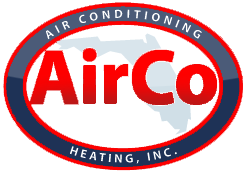Discussing HVAC Filters and Settings
Best Suited for Allergy Sufferers
Allergies can be more than just a seasonal nuisance; for many, they represent a year-round battle. The good news for residents of Jupiter, FL, and surrounding areas is that your HVAC system, when properly equipped and maintained, can be a powerful ally in the fight against airborne allergens such as pollen, dust, and pet dander. At AirCo, we understand the importance of indoor air quality and are committed to helping you optimize your home environment to minimize allergens. Here are some key ways your HVAC system can combat allergens, along with our recommendations for filters and settings that are best suited for allergy sufferers.
The Role of Your HVAC System in Allergen Reduction
Your home’s HVAC system does more than just heat and cool the air; it also plays a critical role in circulating and filtering the air you breathe. Proper use and regular maintenance of your system can significantly reduce the presence of allergens in your indoor environment, thus easing allergy symptoms.
Choosing the Right Filters
1. HEPA Filters
High-Efficiency Particulate Air (HEPA) filters are among the most effective at trapping microscopic particles. HEPA filters can capture particles as small as 0.3 microns with 99.97% efficiency, including pollen, pet dander, dust mites, and most tobacco smoke. Upgrading to HEPA filters can dramatically improve the air quality in your home.
2. MERV Ratings
The Minimum Efficiency Reporting Value (MERV) rates a filter’s ability to capture larger particles between 0.3 and 10 microns. For homes with allergy sufferers, AirCo recommends filters with a MERV rating of 11 to 13. These filters strike a good balance between filtering efficiency and not restricting airflow, which can strain your HVAC system.
3. Electrostatic Filters
These filters use an electric charge to attract and trap airborne particles. Electrostatic filters are washable and reusable, which can be a cost-effective option for continuous allergen control.
Optimizing HVAC Settings for Allergy Relief
1. Maintain a Consistent Humidity Level
Keeping indoor humidity levels in check (ideally between 30% and 50%) can reduce the presence of dust mites and mold, both of which are common allergens. Consider using a dehumidifier in conjunction with your air conditioning system to manage humidity effectively.
2. Regular Air Circulation
Set your HVAC system to “fan” mode to continuously circulate air through the filters, even when it is not heating or cooling. This constant air movement helps to remove allergens from your environment more effectively.
3. Smart Thermostats
Smart thermostats can be programmed to reduce system use when allergies are less problematic, and increase air filtration when higher pollen counts are reported. This not only helps with allergens but also optimizes energy use.
Regular Maintenance Is Key
To ensure that your HVAC system continues to help reduce allergens in your home, regular maintenance is essential. This includes:
1. Filter Changes
Change or clean filters at least every 60 to 90 days, or more frequently during high pollen seasons or if pets are in the home.
2. Duct Cleaning
Consider having your air ducts professionally cleaned if you notice a significant buildup of dust or if allergens are a persistent problem in your home. This can remove accumulated allergens from the system, improving overall air quality.
3. Annual Inspections
Schedule an annual inspection with an HVAC professional to ensure that your system is in peak operating condition. This inspection can identify and resolve any issues that might be affecting your air quality.
For allergy sufferers, the battle against allergens is a serious quality-of-life issue. Fortunately, with the right HVAC system settings, filters, and maintenance, your home can become a refuge from outdoor allergens. At AirCo, we’re committed to helping our Jupiter, FL community breathe easier. Contact us today to learn more about how we can assist in enhancing your home’s air quality and keep allergens at bay with a tailored HVAC solution.



